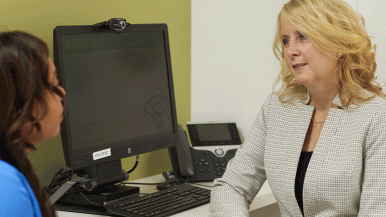While it’s best to never hit your head, it does happen — a lot. You can suffer a head injury at home, at work or at play. You may fall and strike your head on a hard surface. You may get hit in the head with a flying object, like a ball, or collide with someone while playing a sport. And many of us know the painful and embarrassing experience of striking our head while getting in or out of a car, or walking into a door or wall.
Although these contacts are sometimes severe enough to cause a concussion, most of the time they do not. We don’t know the exact force required to cause a concussion, but you should feel comforted by the fact that our skulls do a good job of protecting our brains from most of these events.
So how can you tell whether you or your loved one has suffered a concussion? While there’s no perfect way to make that determination on your own, watch for the following physical complaints or observable changes after a blow to the head:
| Signs of Concussion (changes observed by other people) | Symptoms of Concussion (complaints reported by the person with the head injury) |
| Appears dazed or confused | Headache |
| Repeating questions | Nausea or vomiting |
| Answers questions slowly | Dizziness or imbalance |
| Can't recall events from before or after the injury | Visual changes, like blurred vision |
| Loses consciousness (even briefly) | Ringing in the ears or muffled hearing |
| Exhibits personality or behavioral changes | Sensitivity to light/noise |
| Fatigue | |
| Mentally foggy/feels confused | |
| Thinking slowly |
Here are seven other important things to know about concussion:
1. Talk to a doctor after any head injury — and get immediate help for “danger signs.”
It’s important to contact your pediatrician, primary care physician or concussion specialist after any head injury where a concussion is suspected so they can provide guidance on potential next steps.
Go to the emergency room immediately if you notice or experience any of the following “danger signs” at any time. Fortunately, these are rare, but they can indicate a possible life-threatening injury such as bleeding of the brain:
- One pupil larger than the other
- Significant drowsiness or inability to wake up
- A worsening headache
- Slurred speech
- Decreased coordination
- Weakness, numbness
- Unusual behavior, such as agitation
- Increasingly confused
- Loss of consciousness (even briefly)
Most people recover within one to three weeks, although it can take a little longer in children. People who have suffered a concussion can feel quite symptomatic for the first couple of days, but then the symptoms begin to resolve.
2. Early intervention is better than a long period of rest.
The expert consensus is that people who have suffered a concussion should avoid overstimulating activities for the first 1 to 2 days after their injury.
This is very individualized, as some patients are quite symptomatic and others have milder symptoms. You do not, however, need to rest in a dark room or avoid all activities. It’s fine to use your computer or phone; just take breaks if you are experiencing an increase in your symptoms. What’s most important is that you avoid any activity that risks another blow to the head.
After a couple of days of relative rest, slow progression of both physical and cognitive activity is essential. We know that people who are inactive for long periods of time after a concussion actually take longer to recover. So, it’s about listening to your body and slowly increasing your activity as tolerated.
3. Concussion experts can help you recover faster.
Research has shown that people who see a concussion specialist recover more quickly after a concussion than those who see other types of specialists or don’t seek care at all. So consider an evaluation as soon as possible after the initial 1- to 2-day recovery period.
A concussion specialist will conduct a thorough assessment of the individual symptoms of the injury, then make personalized recommendations for work or school accommodations and specialized care, if needed.
4. You should be able to return to school or work after a few days.
Most people can tolerate returning to work or school within a day or two, but some may need a longer period of time away, particularly if the symptoms make it unsafe to work (e.g., a roofer or delivery driver who is dizzy should steer clear of work).
However, you should work with a concussion specialist to create individualized academic or workplace accommodations.
5. Athletes must recover completely before returning to play.
It’s vital that athletes don’t return to play until they have fully recovered from their concussion. It’s not true that you simply have to wait one week after you last symptom clears up to return to the court or field.
Here are some general guidelines:
- The athlete should be without symptoms both at rest and with higher levels of exertion, including non-contact sport practice.
- They should have a normal neurologic exam and demonstrate intact cognitive functioning.
- Athletes aren’t always honest about their symptoms, so they need to be thoroughly evaluated by a health care provider who is experienced working with concussion before returning to play.
6. If you have lingering symptoms, you don’t have to suffer in silence.
If you or a family member are still having symptoms after two to three weeks, I strongly recommended being evaluated by a concussion specialist. There are proven treatments for persistent post-concussion symptoms, and at Rush, we have clinicians who are highly trained and experienced in addressing these problems. We use the most up-to-date and evidence-based approaches to personalize treatment and give each patient the best possible outcome.
7. Research is helping to improve concussion prevention, diagnosis and treatment.
New methods are evolving and are showing great promise — including using the newest technology to better understand the causes of persistent concussion symptoms.
In terms of more effectively diagnosing concussion, Concussion Care at Rush is the only program in Illinois using the EyeBox system to assess ocular (eye) changes post-concussion. Being able to more precisely assess these changes helps me and my colleagues understand which patients would benefit from earlier treatment.
We are also the only concussion program in Illinois with a post-concussion assessment to evaluate persistent higher-level balance and motor changes that can increase risk of further musculoskeletal injuries.




